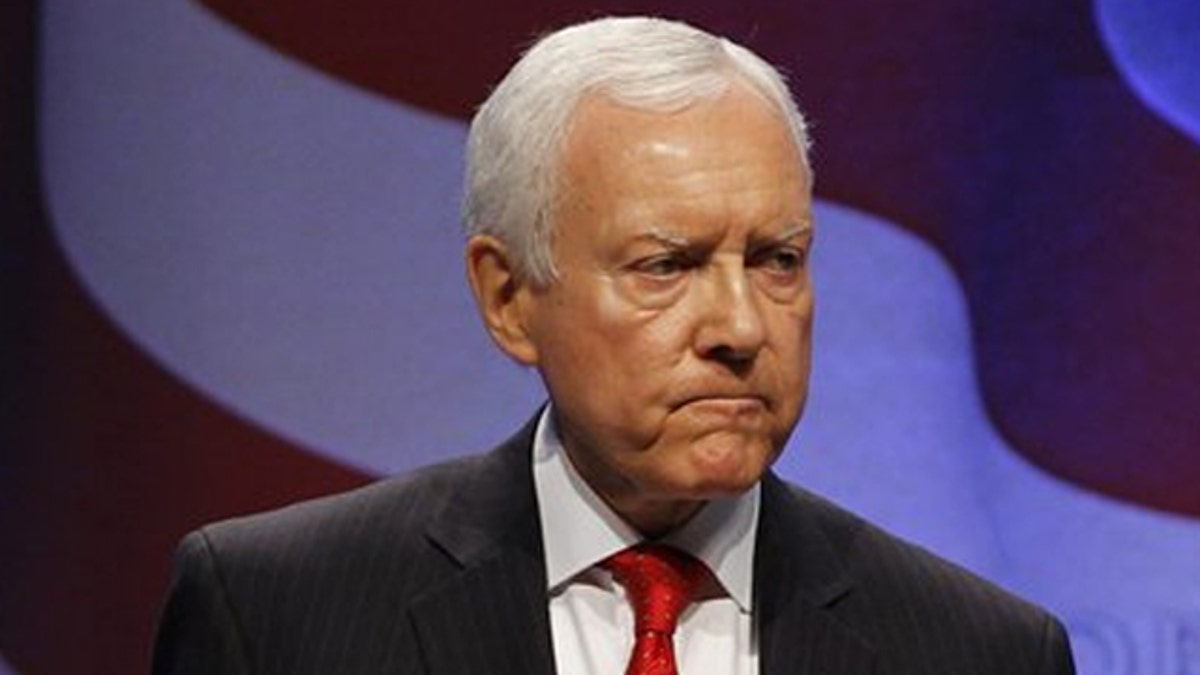
In this Feb. 11 photo, Sen. Orrin Hatch speaks at the Conservative Political Action Conference in Washington. (AP)
As three governors testified on Capitol Hill Tuesday about the burden on states implementing Medicaid, a new report from a joint congressional GOP panel says President Obama's health care reforms will cost $118 billion through 2023 -- twice the estimate claimed by the administration.
Under the Patient Protection and Affordable Care Act passed in the previous Democratic-led Congress, the program to the poor is expanded so that nearly half of those obtaining health care coverage under the new law will be shuttled through Medicaid, which already provides for one in four Americans.
The GOP report out Tuesday, titled, "Medicaid Expansion in the New Health Law: Costs to the States," says that means the PPACA will actually cost more than twice the Congressional Budget Office estimate of $60 billion through 2021.
"With this report, we see the true cost to states, who are already facing a collective $175 billion budget shortfall, of this unsustainable expansion," said Sen. Orrin Hatch, R-Utah, ranking member of the Senate finance panel that joined the report.
"Any sustainable attempt by governors to balance their budgets is undermined by the $118 billion cost of the massive growth of this federal program. It's time for Congress to peel this program back by putting states, not the federal government, back in charge," Hatch said.
Rep. Fred Upton, R-Mich, chairman of the House Energy and Commerce Committee, which also participated in the joint GOP report, said the laws enacted in Washington will have a "profound impact on state budgets."
For instance, California will spend at least another $19.4 billion on Medicaid during that time than was expected. Texas is estimated to spend another $27 billion. Kentucky will face $675 million in new costs and Idaho will expand its Medicaid program by nearly 50 percent.
But the Urban Institute issued its own report on Tuesday estimating that 12 million newly eligible Medicaid enrollees would cost $54 billion nationally, of which the federal government would pay about $45 billion.
There were several reasons for the discrepancy in numbers. The GOP report calculated costs through 2023; the Urban Institute took only a one-year snapshot. The GOP report also looked at just the cost to states; the Urban Institute looked at total costs.
Urban Institute senior researcher Matt Buettgens said that if they used the same parameters as the GOP report, the estimate would probably line up more with the CBO estimate of $60 billion. However, Buettgens said the GOP report is probably factoring in administrative costs, as opposed to just the direct cost of health care, which would account for why the GOP number is so much higher.
The GOP estimates 16 million will join Medicaid, and governors have pegged that number at around 20 million. Already, 8 million Americans joined the rolls between 2007 and 2010 -- after losing their jobs. Medicaid averages nearly a quarter of states' annual budgets.
"The biggest (budget item) that is eating all of us alive is Medicaid," Kansas Gov. Sam Brownback said.
For governors, getting costs under control means "flexibility."
"The truth is you all would save a lot more money if you let us run the program," Mississippi Gov. Haley Barbour, a Republican, told Upton's panel on Tuesday.
Barbour suggested block grants from the federal government would provide the flexibility governors need so they don't have to "kowtow and kiss the ring."
But while President Obama said Monday that he wanted to help governors find ways to expand health care coverage, the administration said it would reject block grants.
Delaware Democratic Gov. Jack Markell, who was not at the hearing, told Fox News that Obama asked governors over the weekend to come up with a list of ideas that they think are important to keep costs under control. They are now pursuing several ideas.
"The really positive thing to come out of this weekend is the president made very clear he understands what an economic challenge this is across the country and he wants to help," Markell said.




